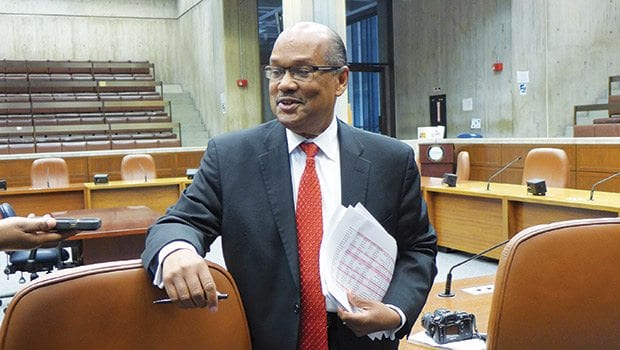Yancey continues push for diversity
Highlights inequities in hiring, pay

With the end of his term approaching, City Councilor Charles Yancey convened on Monday a hearing of a committee that’s been part of city government almost as long as he has.
The Post Audit and Oversight Committee, founded in 1984 by Yancey one year after he entered office, reported that the Police and Fire Departments spent vastly above budget on employee overtime last fiscal year, while also failing to hire enough people of color.
“If the trend continues, the Fire Department will be less, not more, representative of the city of Boston,” said Yancey, who chairs the committee.
The city government as a whole also showed marked racial disparities in pay for FY2014-2015, especially among the top earners, Yancey announced.
Overruns in overtime
Both Fire and Police ran past their overtime budgets, to the tune of approximately $5 million and $25 million, respectively.
“That deficit is larger than most city departments’ [budgets],” said Yancey, speaking of the BPD.
For public safety jobs, some amount of overtime comes with the territory. But, Yancey said, this is far from the first year such expenses have come from the departments, and the extent and frequency of overspending in this area suggests need for re-examining schedules or hiring.
That is not the only reason to focus on hiring. Boston is nearly 47 percent white non-Latino, according to the 2010 federal census. Yet Yancey reported that 72 percent of Fire Department employees are white.
The Fire Department’s announcement last year that it would appoint a diversity officer implies it sees a need for change, but action has been slow to come. The department hired this year’s incoming class of firefighters before filling the diversity officer position, Yancey said. According to his data, the new class is more than 80 percent white.
Police and the public works department also have notable diversity disparities, he said.
Missing from the top
The percent of blacks in the city’s employ roughly corresponds to blacks’ proportion of Boston’s population, while these employment numbers fall short for Latinos and Asians. Whites are over-represented in city government, according to information gathered by Yancey. The city had nearly 8,000 people in its employ as of June 30.
When one considers the highest paid city employees, disparities become dramatic. Of the 525 top-earners, 83 percent are white, while 12 percent are black, 4 percent Latino and 1 percent Asian.
On average, white city employees makes $74,092. The salary drops by nearly ten thousand dollars for blacks, who make $64,391 and even further for Latinos, to $63,034.
The employment and pay figures do not include the School Department, which did not supply information.
Some of the gap may be attributed to the lack of diversity in the highest-salaried departments. Boston’s Fire Department is among the best paying in the country, according to The Boston Globe.
“The average salaries in the city of Boston have great variations based on race, in part because of concentration of certain races in the higher-paying categories such as fire fighters,” Yancey said.
The disparity has existed for decades.
“After 32 years [on this committee], I confess to being a little frustrated,” Yancey said. “While we’ve made improvements, there are persistent disparities that would have a dramatic impact on basic income going into various communities in city of Boston.”
Empty seats
Notably absent from the meeting were the representatives of Boston’s Fire, Police and Public Works departments, whose performances were the focus of the hearing. The audience consisted solely of several members of the media and, for part of the time, one supporter.
This was not the first time Yancey found himself speaking to a near empty room on behalf of the Post Audit and Oversight Committee. The issue of attendance evoked high tension earlier this year, when Yancey accused the Walsh administration of “boycotting” the hearings. Administration officials shot back that the schedule — which included 30 meetings last year and has reached ten so far this year — was unreasonable.
Monday would have been the first time this year that Fire, Police and Public Works met with the committee to discuss and answer questions on its findings. Yancey called the department heads’ failures to appear or send staff members “inexcusable.” Departments cited the Thanksgiving holiday and inadequate notice, Yancey said. Invitations went out a week in advance.
December 15 is the last time a makeup meeting could be scheduled.
Legacy of diversity
Over the years, the Post Audit and Oversight Committee has fought to increase diversity in city government and hold departments responsible for their spending.
There have been some dramatic moments in the past decades. During Raymond Flynn’s administration, the committee discovered that one individual was on two payrolls.
But its main achievement has been ensuring department heads know they will be held accountable to explain their diversity levels, Yancey said.
“Since 1984, I haven’t let up one bit,” said Yancey. “[The committee’s main achievement has been] holding three administrations’ feet to the fire to ensure they live up to responsibility of hiring women and people of color.”
Diversity levels have increased since the ‘80s, but there is still far to go, Yancey said.
Soon the committee’s role in that struggle will be led by another chair, as Yancey leaves office. He has no idea who that will be, he said, but he is not worried.






